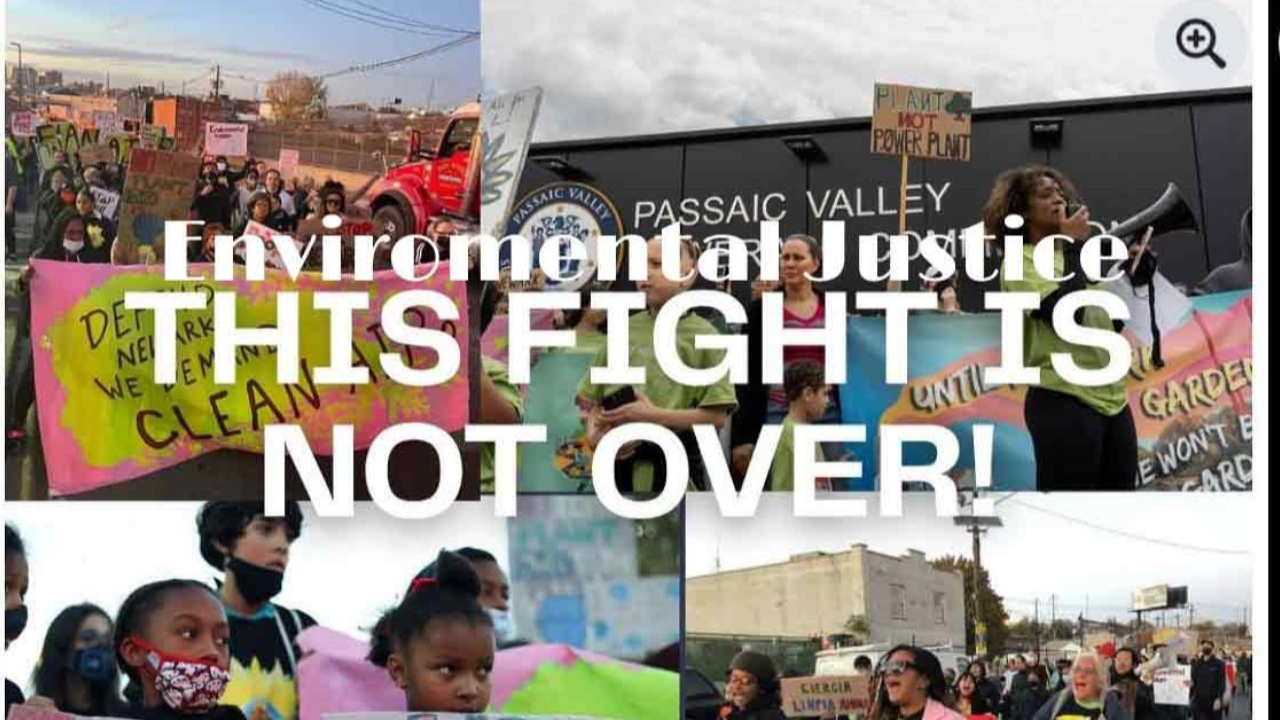Harrison’s James Doran Votes YES to Gas Plant Amid Community Outcry
Jun 23, 2025
On June 12, 2025, Harrison Councilman and Harrison’s Public Schools Director of Personnel James Doran voted YES as a Commissioner of the Passaic Valley Sewerage Commission (PVSC) to approve a fourth gas-powered plant in the Ironbound section of Newark, a facility directly across the Passaic River from Harrison, New Jersey.
Doran joined five other Commissioners in approving the controversial plant despite widespread public opposition, environmental concerns, and the plant’s proximity to residential communities in both Newark and Harrison. Two of the Commissioners of PVSC voted “NO” to the fourth-gas-powered plant.
A Vote Against Environmental Justice
Doran’s affirmative vote aligned him with Commissioners Joseph F. Isola, Elizabeth Calabrese, Brendan Murphy, John Cosgrove, and Hector Lora, none of whom reside near the PVSC facility. The plant will be located in a neighborhood already overburdened with pollution.
In stark contrast, Newark Councilman Luis Quintana and Newark Council President C. Lawrence Crump, both of whom live in the affected area, voted “NO.” Crump questioned the need for the plant, and Quintana cited pleas from Newark residents demanding environmental justice.
Four-Year Campaign Ignored
For four years, the Ironbound Community Corporation (ICC) led a grassroots effort urging PVSC Commissioners to reject the gas plant in favor of a non-polluting battery backup system. The group succeeded in gaining the support of Tammy Murphy, wife of New Jersey Governor Phil Murphy, but NOT the governor himself.
In a biting protest image, ICC depicted Murphy against a backdrop of smokestacks with the caption:
“On Governor Murphy’s Watch, PVSC Just Approved What Would Be The 4th Gas Plant In Newark, NJ.”

Graphic Photo Courtesy Ironbound Community Corporation
Governor Murphy’s support for the Power Plant is surprising, especially since the Governor in 2020 chose the Ironbound Section of Newark as the location where he wanted to sign into law New Jersey’s Environmental Justice Law. The Governor praised the ICC leadership for its work on behalf of Environmental Justice and allowed PVSC to, in effect, go around the Environmental Justice Law using another state agency, NJDEP, which is supposed to protect the environment, not support a sister agency in getting an application approved without having to comply with New Jersey's Envionmental Justice law.
Governor Murphy’s Weakness With Quasi-State Agencies
It isn’t the first time that Governor Murphy has turned his back on communities that would be considered environmentally challenged. Governor Murphy stood by without making any comment on the high level of emissions of toxic hydrogen sulfide gas from the New Jersey Sports & Exhibition Authority (NJSEA) Keegan Landfill in Kearny. It was only after the community and the Town of Kearny's elected officials stood up against NJSEA and won their case did Governor Murphy speak.
Governor Murphy only spoke after a unanimous New Jersey Supreme Court ordered the Closing & Capping of the Keegan Landfill because the justices found that the landfill was causing irreparable harm. Irreparable harm is a very high bar to surmount. The latter tells you how bad the toxic hydrogen sulfide gas was at the time, but Governor Murphy preferred to remain silent. Murphy’s New Jersey Department of Environmental Justice was also ineffective against its quasi-state agency, NJSEA.
But for the residents standing up to fight for their own health, the Keegan Landfill would still be open. Keegan is still NOT Capped and is using old technology to burn hydrogen sulfide gases and methane gases emitted from it. Morris County’s Fenimore landfill has the newest technology, but NJSEA Commissioners, like PVSC Commissioners, don’t live in the community. That draws the contrast as to why Harrison’s James Doran YES vote is so egregious.
PVSC’s Hurricane Sandy Justification Challenged
PVSC management argued the new gas plant was necessary to prevent sewage overflow during storms like Hurricane Sandy, which overwhelmed the PVSC plant and flooded nearby neighborhoods with sewerage. In Harrison, the Hurricane Sandy surge swept past the PATH station up South Frank E. Rodgers Blvd. and nearly reached Bergen Street. The water surge stopped at the Bank of America building. Rescue operations by boat were needed, and many homeowners in the 1st and 2nd Wards of Harrison had water damage from flooded basements.
Critics argue that a fourth power plant would not prevent such flooding, which occurs within seconds, nor protect the PVSC facility in the event of a future storm surge. It is not the power outage from the Power Plant getting flooded. It is the surge itself that caused raw sewage to go into the residential neighborhood. PVSC Commissioners plan to build a Dioxin Laden Sludge Plant next to its Sewerage Plant.
Dioxin Laden Slludge Plant Danger
If the Hurricane Sandy surge had hit the Dioxin Laden Sludge Plant, the cancer-causing dioxin would have gone where the PVSC Sewerage went. That fact is not stopping the PVSC Commissioners from hosting the sludge plant. Nor is it stopping Harrison Mayor James Fife and Councilman & PVSC Commissioner James Doran from supporting a Toxic Sludge Plant in a residential community in Harrison. One wonders what the Mayor & Commissioners' motivation is for risking public health. What do they get out of supporting a 4th Power Plant and 2 Toxic Sludge Plants?
Toxic Sludge Plant: A Second Environmental Threat
In addition to the gas plant, PVSC plans to host a Toxic Sludge Dewatering Facility adjacent to its sewage treatment plant on Wilson Avenue. This facility will process dioxin-laden sediment from sludge that is dredged from the bottom of the Passaic River. EPA admits that “as is” at the bottom of the Passaic River, there is no danger to public health except for anyone eating fish or crabs from the Passaic River. We don’t know anyone who would do that, and there are signs on the bridges and riverbanks to warn against that. EPA, however, says that the sludge will contain dioxins, which, if they get airborne, are microscopic and can cause cancer if inhaled.
Let us not forget that EPA plans to use the Diamond Alkali Superfund site, one of the most toxic in the U.S., contaminated properties where the production of the herbicide Agent Orange occurred during the Vietnam War, as a Construction & Staging Area for materials for the EPA’s Planned Toxic Sludge clean up.. Diamond Alkali is on Lister Avenue in the Ironbound Section of Newark.

+PVSC Commissioner James Doan Thumbs Up for Toxic Sludge & Gas-Burning Power Plants.
If a future surge similar to Sandy occurs, toxic sludge could be released into nearby neighborhoods. There are also airborne risks, including the spread of carcinogenic dioxins.
In Newark, the sludge site is at least one mile from residential areas. In Harrison, however, the proposed EPA sludge facility would be located directly across the street from new apartment complexes built in the Harrison Redevelopment Zone. The property was completely cleaned up at the cost of $367 to $400 million and designated for future green space.
James Doran’s Role Under Scrutiny
Harrison’s James Doran has been a central figure in both environmental controversies:
- As PVSC Commissioner, he voted YES to the fourth gas plant.
- As Councilman and School Personnel Director, he is accused of misleading Harrison residents in 2022 by denying the existence of plans for the EPA sludge plant, despite recorded statements from that year confirming those plans at a Harrison Redevelopment Agency Zoom meeting.
Doran’s dual support for two industrial facilities in what is now a residential zone has sparked outrage from residents.
Ironbound and Harrison: Overburdened Communities
Both communities already bear significant environmental stress:
- Three existing gas power plants
- The Covanta (Reworld) incinerator, infamous for releasing colored smoke from pesticide burning
- The Diamond Alkali Superfund site, capped but still hazardous, with no way to move its toxic cocktail of chemicals from its current site.
- Heavy diesel truck traffic to and from Port Newark traffic
- Newark Airport flight paths overhead with emissions there.
- The Keegan Landfill in Kearny, emitting hydrogen sulfide and methane, despite an NJ Supreme Court order for closure & capping, remains uncapped and uses old technology (burning off the latter gases in a torch-like device)
These factors contribute to asthma rates nearly three times the state average, for the Ironbound section of Newark especially among children.
Community Opposition and Legal Action Ahead
Despite “tearful testimony” at PVSC’s meeting, the vote went ahead. Earthjustice attorney Jonathan Smith warned that the plant’s startup and shutdown periods release the most pollution, and that hydrogen combustion could result in even higher emissions of nitrogen oxides (NOx).
State leaders, including Senator Teresa Ruiz and Assembly Members Eliana Pintor Marin and Shanique Speight condemned the vote as a betrayal of environmental justice.
Community groups are now weighing legal challenges under the state’s Environmental Justice law. ICC, Earthjustice, and the New Jersey Environmental Justice Alliance (NJEJA) have pledged further legal scrutiny and possible litigation.
What’s Next
- PVSC must finalize contracts, secure permits, and begin construction.
- EPA is expected to move forward with the Harrison toxic sludge facility, despite protests from residents..
How to Get Involved
- Attend upcoming PVSC, EPA & Town of Harrison public meetings (Mayor & Council, Harrison Redevelopment Agency)
- Contact your local representatives to demand:
- Battery backup systems (instead of gas)
- Relocation of toxic sludge processing away from homes into the industrial South Kearny, putting a buffer between cancer-causing chemicals and the public.
The decision to build a fourth gas plant and a toxic sludge facility in overburdened communities like Harrison and the Ironbound exposes systemic failures in protecting environmental justice. Residents say they are not just fighting pollution, they are fighting for their right to clean air, honest governance, and a future free from toxic legacies.
📣 Tell us what you think on our Community Discussion Board. Not a member yet? Sign up today and be part of the conversation that shapes how Harrison honors our shared past and future.

